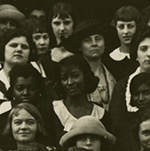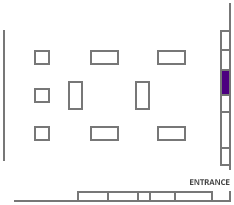 University Library
What She Said
University Library
What She Said
Part II: Women Together
Part III: Issue Spotlights
 University Library
What She Said
University Library
What She Said
Part II: Women Together
Part III: Issue Spotlights
Opponents of woman suffrage attacked aggressively on several fronts. The state-by-state approach adopted by early suffragists found unexpected support from suffrage opponents, who valued repeated opportunities to limit or prevent woman suffrage. Indeed, in some locations women won full enfranchisement decades before passage of the 19th Amendment, but in many they were permitted to vote only in school board or other special elections, or failed to gain any voting rights at all.
Other opponents used race-based fear mongering to attack suffragists. They were successful in fueling existing divisions within the movement as well-known suffragists like Elizabeth Cady Stanton advanced racist arguments in favor of prioritizing white women's voting rights to overcome the "incoming tide of ignorance, poverty and vice" she felt black men would bring to voting booths. Stanton and Susan B. Anthony allied themselves with southern politicians to build support for women's voting rights. Many suffragists also advocated for "educated suffrage," which required literacy to vote, eliminating many black and immigrant Americans from eligibility, regardless of sex or citizenship.
Some woman suffrage opponents felt voting fell outside traditional roles in the home. These arguments were advanced most notably by men like Elihu Root, who asserted women engaged in civic life behaved against their fundamental natures. At the end of her life Stanton led a group of women in writing The Woman's Bible, a work that consisted of bible passages with interpretive commentary. It advanced Stanton's response to sexist anti-suffrage arguments, directly challenging the religious orthodoxy that women should be subservient to men. Upon publication the highly controversial work was attacked by anti-suffragists and suffragists alike.
Case 4, Suffrage in American Culture, is to your right on the east wall of the gallery.
1
Pamphlet, Mary A. J. M'Intire. "Of No Benefit to Woman: She is a Far Greater Power Without Suffrage," reprinted editorial from the Boston Sunday Herald issued by the Massachusetts Association opposed to the Further Extension of Suffrage to Women, circa 1895Women's Suffrage Collection
2
Pamphlet, "Poll Parrotry and Wickedness," reprinted editorial from the New York Sun issued by Pennsylvania Association Opposed to Woman Suffrage, circa 1914Women's Suffrage Collection
3
Carlos White. Ecce Femina: An Attempt to Solve the Woman Question. Hanover, NH: Carlos White, 1870.JK 1901 W58 1870
4
Harold Owen. Woman Adrift: A Statement of the Case Against Suffragism. New York: E.P. Dutton & Co., 1912.JN 983 O7 1912
5
Carte de Visite, Elizabeth Cady Stanton, with bible verseWomen's Suffrage Collection
6
Pamphlet, "Address Delivered by the Hon. Elihu Root, Before the New York State Constitutional Convention on August 15th, 1894," issued by the New York State Association Opposed to Woman SuffrageWomen's Suffrage Collection
7
Anti-Suffrage Pamphlet showing sections titled "The Handwriting on the Wall," "Why Female Suffrage Would be Inexpedient," and "California"Women's Suffrage Collection
8
Anti-Suffrage Broadside featuring quotations and excerpts from Carrie Chapman Catt, Susan B. Anthony, Anna Howard Shaw, and othersWomen's Suffrage Collection
9
Broadside, "The Woman's Bible, Editor Elizabeth Cady Stanton…" circa 1898Women's Suffrage Collection
10
Broadside, "A Loss to All Women; An Injury to the State: Why Elihu Root Opposes Woman Suffrage"Women's Suffrage Collection
